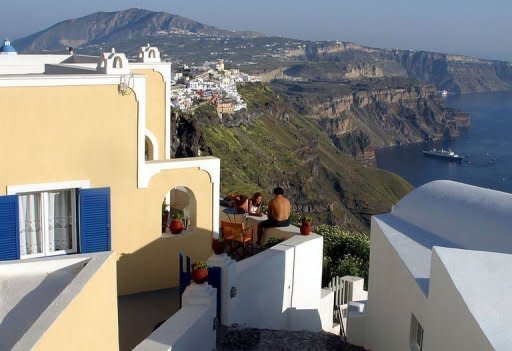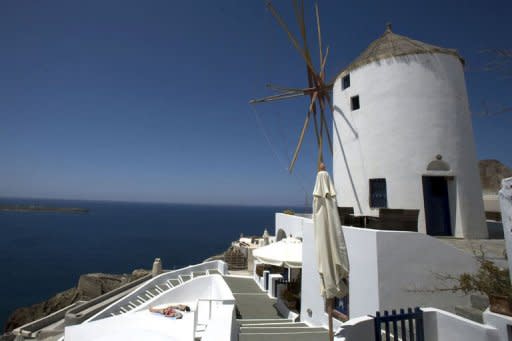Sunset isle Santorini tries to ignore Greek debt crisis
Twenty euros ($26) for a pair of flip-flops, 10 euros for a five-minute taxi ride and store prices that send even locals to Athens. Welcome to Santorini, the island that forgot Greece's economic crisis. Voted the world's best island by Travel + Leisure magazine in 2011, the Cyclades tourism powerhouse continues to live in an inflation bubble as the rest of the country sees salaries and pensions plummet by up to 40 percent. The enduring boom is built on money spent by thousands of travellers who flock to Santorini by cruise ship, ferry and plane each day, drawn by the island's whitewashed villages, volcanic beaches and jaw-dropping sunset vistas. The island was home to a technologically advanced Bronze Age civilisation that was destroyed by a massive volcanic eruption in the 17th century BCE. The eruption collapsed part of the island, shaping a deep caldera basin and etching steep cliffs that are Santorini's main attractions today, in addition to the quality wines grown on the island's volcanic soil. The reopening of the archaeological site of Akrotiri, a Bronze Age urban centre that boasted multi-storeyed buildings, magnificent wall paintings and an elaborate drainage system, further boosts the island's appeal. Nearly 180,000 foreign nationals flew into Santorini last year, up 10.5 percent, and about 80 percent of all visitors are non-Greek, many of them honeymoon travellers and retired couples. But even visitors with deeper pockets are now starting to chafe. "I just paid 3.50 euros ($4.60) for a can of Coca-Cola, it's the most expensive I've ever had in my life," protested Denise, a 59-year-old from Rio de Janeiro on a 40-day southern Europe tour with her husband. The Brazilian couple were fortunate. With the help of a local car rental operator, they secured a small room with a splendid view of the caldera for just 60 euros a night, bargained down from a first asking price of 170 euros. For most of their seven-day stay, they were the hotel's sole guests. Online, visitors question the island's luxury accommodation pedigree given the state of many rooms. "There is no question that the views here are amazing, but this is an unfortunate example of greedy, unprofessional hoteliers jumping on the 'luxury boutique' bandwagon and doing it on the cheap," one traveller wrote on the tripadvisor.com site. Most of Santorini's hotels are currently near-empty but despite that, a double room with a caldera view can easily cost 300 euros ($395) a night, and suites are often priced at over 700 euros. Many establishments arbitrarily claim five-star status. "Santorini has a unique product but it's true that the cost should be linked to the level of service received," noted George Drakopoulos, general manager of the association of Greek tourism enterprises. He stressed however that "the market has a way of correcting such issues," and added: "Nobody forces people to travel to Santorini." A souvenir vendor in the island capital of Fira complained meanwhile that "we have to use binoculars to see tourists, they did not even come for the Catholic Easter holiday. "In previous years we were 60 percent full at this time of year. Now it's down to 20-30 percent," he said. As for local inhabitants, the minimum salary in Greece has been slashed to under 600 euros and many employees clear less than 1,000 euros a month as the government cuts spending to balance the strained public finances. Hotel and shop staff on Santorini earn similar wages. "I make 25 euros a day and I can't afford to give it away for a kilo of meat or a return taxi fare," says Despoina, a hotel worker. "When I first arrived, I was asked to pay between 300 and 400 euros to rent a room," she said, the equivalent of monthly rent for a flat in Athens. "I've lived on Santorini for 10 years but I haven't shopped here in three," said a Moldovan shop worker. "I ask friends to bring me stuff from Athens." Challenged over Santorini's exorbitant prices, many locals shrug. "We also live in Greece and we too have trouble making ends meet," said a handicraft shop owner. "It's true that prices should be lower if we are to attract visitors during the crisis," a taxi driver admitted after trying to claim a double fare. "But we only have five months to earn money for the entire year," she said. Yiannis Stournaras, general director of the Greek foundation for social and economic research, notes that tourist prices have not dropped as radically as costs for businesses. "It is a fact that wages go down but prices keep on the same level for the tourists," he told AFP. "In the case of Santorini, it might be because it is a unique place and the hotel owners don't want to underestimate their product. But it is an issue here -- prices do not adapt and it is not normal," he said. The union of Santorini hoteliers was not immediately available for comment.





